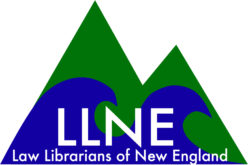We are so excited for the LLNE / SNELLA Spring 2022 Meeting! In anticipation of our day at Yale Law School discussing Critical Law Librarianship, we hope you enjoy this interview with the keynote speaker:

- Tell us a fun fact about yourself! I’m a host for a breeding mom for Leader Dogs for the Blind. That means that I help whelp and raise future guide dogs. Here’s a link that describes our work: Voices of the Leader Dog Community: Lauren Eckberg and Justin Simard – Leader Dogs for the Blind
- What is your favorite Michigan spot and why? I’ve only been in Michigan for a couple of years, so I haven’t had the chance to explore as much as I’d like. Bath, a town near East Lansing, has some great dirt roads for running and trails for cross country skiing. That might be my favorite spot so far.
- Do you have any pets? Yes. In addition to the breeding mom, Java, who is a black lab, I have two cats: Ella and Mäusel.
- What is your favorite hobby? I enjoy distance running.
- What do you enjoy most about being a law librarian? My favorite thing about being a professor is exploring ideas that are important to me and sharing them with my students and others. I love talking with law librarians because of our shared interests in legal research and citation.
- How did you end up where you are, doing what you’re doing? How did you end up in your specialty? I developed an interest in American intellectual history in college thanks to Professor Thomas Haskell, whose class I took in my first semester at Rice University. I had also been interested in the law, and Professor Haskell encouraged me to pursue a J.D. in addition to a Ph.D. In graduate school, my advisor, Professor Sarah Barringer Gordon, introduced me to the graduates of the Litchfield Law School. Using them as a starting point, I ended up studying how the legal profession’s work drafting agreements, performing due diligence, securing notes, and giving advice shaped the American economy. This commercial role brought lawyers into direct contact with the law of slavery. When I found out that some of the opinions they wrote were still being cited today, I began to study that influence and catalog it at www.citingslavery.org
- What do you think is one of the most important aspects of critical law librarianship? It is important to examine what is often unexamined. Critical law librarianship can encourage the legal profession to reflect on what it often takes for granted.
